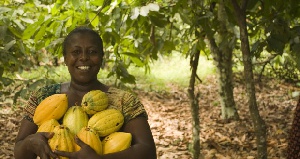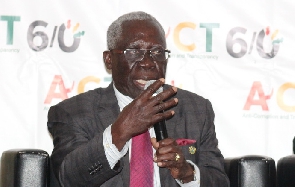The Quality Control Company Limited (QCC) of COCOBOD has dismissed claims that it used vegetable oil for pest control on some cocoa farms.
There were media reports suggesting that the company has bought off-the-shelf vegetable oil at an overpriced cost compared to what is commonly found in local shops.
But a statement issued by the Ghana COCOBOD which has supervisory role over the QCC said the assertions are untrue.
“QCC a subsidiary of the Ghana Cocoa Board (COCOBOD), is to ensure that all parcels of cocoa delivered both to the local and international markets are of premium grade and free from pests. It is in the exercise of this mandate, particularly, with respect to pest control, that the company purchased Biodiesel early this year – which is made from vegetable oil that has been transformed through chemical processes. Infestation of cocoa by pests is controlled through disinfestation activities carried out by QCC using evaluated and approved insecticides,” the statement said.
The QCC further maintained that it is cautious about the health of consumers hence will not jeopardize the system to reduce the quality of cocoa beans produced in Ghana.
“One category of these insecticides is Ultra Low Volume (ULV) insecticides which normally are available in concentrated forms and have to be diluted using appropriate oil-based diluents (a diluting agent or thinner) prior to its application on cocoa farms. In the past QCC was using mineral oils in diluting ULV insecticides for disinfestation operations. However, in compliance with International Food Safety Regulations, the Company is now employing the use of biodiesel (made from vegetable oil) as a diluent for the ULV insecticides currently in use and those being evaluated.”
It added, “ It is important to know that, even some vegetable oils (i.e. oils from seeds of certain plants) are not good for human consumption but may have economic benefits, for example, cottonseed oil and rapeseed oil. In this regard, not all vegetable oils are edible vegetable cooking oils. Furthermore, in compliance with International Standards, QCC procures all its insecticides from companies whose products have been evaluated and approved by its research laboratory. We wish to state that Freight Accord Limited was one of three (3) companies QCC sole-sourced to supply this type of oil. We take this opportunity to remind Ghanaians of the honorable reputation that the nation’s cocoa has internationally, as being of the very best quality compared to those produced in other countries.”
Again, the statement noted, “To make biodiesel, vegetable oils have to be transformed through hydrolysis and further subjected to transesterification. This results in the production of Fatty Acid Methyl Esters (FAME) commonly referred to as biodiesel or industrial oil. We wish to make it clear to the public that biodiesel, also called industrial oil, is very different from our everyday off-the-shelf vegetable cooking oil. Although biodiesel (industrial oil) is made from vegetable oil, it is not vegetable cooking oil. It is completely different from vegetable cooking oil because it is not for edible purposes and therefore, cannot be found on the shelves of markets across the country.”













